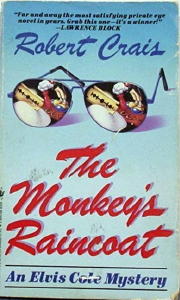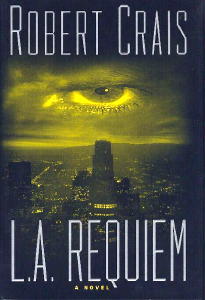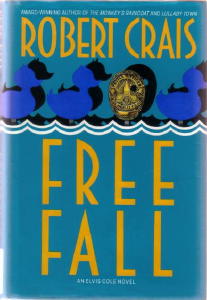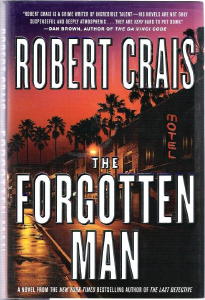|
“... IF THE DAY GOT ANY BETTER, MY CAT
WOULD DIE”
-Elvis Cole, Private Eye by Tom Jenkins  “Raymond Chandler’s Los Angeles is
observed and described with such sardonic precision that his Philip
Marlowe novels have actually helped form the way we perceive that
city.”
Extending Chandler’s motif into the 21 st century, Robert Crais gives us a heightened depiction of that city’s tragedy and comedy in his Elvis Cole private eye novels. ***
Carrying forward the hard-boiled detective genre developed by Raymond Chandler and Ross Macdonald, and currently embellished by Robert B. Parker, the craftsmanship reached by Robert Crais in his recent Elvis Cole novels perhaps equals if not on occasion surpasses that of his illustrious predecessors. Both brainy and emotional, Elvis Cole, Crais’ private eye protagonist, moves confidently through the predicament of his partner Joe Pike’s mortal jeopardy. Cole lives alone in an A-frame house cantilevered over Laurel Canyon in the hills above Hollywood except for his somewhat feral housecat that is hostile to everyone but Cole and Pike. Cole drinks Evian, likes to cook, and performs yoga, tai chi and tae kwon do, with his regular ritual of greeting the dawn with a dozen perfect “salutes to the sun.” Cole is a subtle kind of macho man, usually calm and reflective as his mind focuses on a problem, solving a puzzle, finding and rescuing a lost person, finding a way out for a falsely accused victim and dealing successively with the bureaucracy, investigative detail and convoluted conditions of life in the L. A. monolith. Cole is both enthralled and stymied by the velvet trap of L. A. “It is a great sprawling spread-to-hell city that protects us by its sheer size. Four hundred sixty-five square miles. Eleven million beating hearts in L. A. County, documented and not. What are the odds? The girl raped beneath the Hollywood sign isn’t your sister, the boy backstroking in a red pool isn’t your son, the splatter patterns on the ATM machine are sourceless art. We’re safe that way. When it happens, it’s going to happen to someone else. Only thing is, when she walks out of your door, it isn’t someone else. It’s you.” Joe Pike is a piece of work, but that’s good. Cole’s friend and 13-year partner is self-disciplined, former Marine and ex-LAPD cop who is an indomitable force in assisting Cole in his investigations. Pike is a taciturn perfectionist. “There is a machine-like quality to Pike,” Crais explains, “as if he had tuned his body the way he might have tuned his jeep, and, as the jeep was perfectly tuned, so was his body. It was easy to imagine him doing 1,000 pushups or running 100 miles, as if his body were an instrument of his mind, as if his mind were a well of limitless resource and unimaginable strength.” Pike, akin to Spenser’s Hawk, has a similar relationship to Cole. (With Spenser/Hawk, Parker has set the definitive standard for the professional partnership as it transcends all boundaries including race, although his depiction of a love relationship between Spenser and Susan is slightly marred by their bookish dialogues on psychology.) Both Pike and Hawk galvanize their respective narratives whenever they are present, their terse language highlighting both the characterization ofCrais and Spenser and the pace of the plots.
ROBERT CRAIS’
NOVELS.
 The Monkey’s Raincoat
(1987) introduces private eye Elvis Cole who is hired to find Ellen
Lang’s husband and young son. The search involves Joe Pike and
takes them to Hollywood studio lots and expensive homes and beyond to
drugs and murder. It earned Crais both the Anthony and Macavity
Awards. The Monkey’s Raincoat
(1987) introduces private eye Elvis Cole who is hired to find Ellen
Lang’s husband and young son. The search involves Joe Pike and
takes them to Hollywood studio lots and expensive homes and beyond to
drugs and murder. It earned Crais both the Anthony and Macavity
Awards.In Stalking the Angel (1989), Cole’s persistent wisecracking continues. It begins with: “I was standing on my head in the middle of my office when the door opened and the best looking woman I’d seen in three weeks walked in.” He is hired to find a missing copy of the Hagakure, a valued book on the proper behavior of the Samurai, which leads to a Yakuza (the notorious Japanese mafia) power struggle, multiple murders, the fate of a runaway teenager and a bloody climax. Cole leaves L. A. in Lullaby Town (1992) for Chelam, CT, hired by a megalomaniac Hollywood director to find the divorced mother of his son because of having gained some deep pockets and a partial conscience. The search leads to the discovery of money laundering for the Mafia and Cole’s protection of the woman, extricating her from a seemingly intractable predicament as well as keeping her former husband at bay. In Free Fall (1993), Jennifer Sheridan wants Cole to find out if what is disturbing her fiancé (an undercover cop with an elite LAPD unit), whether it is illicit police activity or involvement with another woman. It proceeds to brutality and tainted blood. One of Crais’ classic humorous scenes takes place in this novel (see section on HUMOR). Voodoo River ( 1995) takes Cole out of L. A. again to Louisiana to locate TV star Jodi Taylor’s birth parents and to uncover her medical history. The search reveals a 30-year-old crime (reminiscent of Ross Macdonald’s novels), the discovery of which brings conflict and the revelation of an ongoing illegal-alien smuggling operation. Cole asks Pike to help him again. In this novel, Cole meets a beautiful attorney, Lucy Chenier, who becomes his potential love. Back in L.A. again in Sunset Express (1996), Cole is hired by Jonathan Green, a flamboyant L. A. defense attorney, to help defend Teddy Martin who is accused of murdering his wife (a setup). The story includes the work history of detective Angela Rossi, which in turn is complicated by her own past history with Pike. Cole’s romance with Lucy is heightened in this one. In Indigo Slam (1997), Cole is approached by three young children who want him to find their missing father who turns out to be a counterfeiter, a possible drug addict, having fled a witness protection program and being pursued by Russian mobsters, and a cancer patient. Cole wants Lucy to move to L. A., but her possessive ex-husband is an obstacle. L.A. Requiem (1999), is a deeper novel than anything he had previously written. Centered on Joe Pike, it reveals more about the self-contained partner than in all ofCrais’ previous novels. There is considerable imaginative detail, realistic police procedural data and the creation of a revengeful cop, Harvey Krantz, whose hatred of Pike almost undoes him and Cole. Lucy becomes disappointed with Cole as he turns his attention away from her and to helping Pike; only Cole and Samantha Dolan (a new character) save the day for Pike. The plot of L. A. Requiem is complex. When Pike’s former girlfriend (Karen) disappears, Karen’s father turns to Cole and Pike for help. Pike is condemned by his former LAPD co-workers who blame him for Pike’s former partner’s death. When the man who discovered Karen’s body is murdered, Pike is also blamed for his death. The situation becomes more complicated with multiple murders by a serial killer, Pike’s confinement in jail, the tragic death of a major player in Cole’s life and the compounding of it all for Cole by Lucy’s recalcitrant feelings. Cole has a major challenge in this novel.  L.A. REQUIEM: SUPERB NARRATIVE PACE AND
DIALOGUE L.A. REQUIEM: SUPERB NARRATIVE PACE AND
DIALOGUEL. A Requiem has power. The multiple narrative viewpoints and the tight dialogue sustain the tension throughout the novel until the resolution of Pike’s framed murder charge, which also puts at risk the lives of Cole, Lucy, her son and Samantha, a feisty and beautiful LAPD officer who falls for Cole. Crais has a smooth balance of descriptive narration and dialogue, free from attitudinizing. It’s like the story is telling itself, although much ofthe novel is framed through the eyes of Cole. After frustration and tragedy, Cole understands the implicit emotion behind the deranged killer. From this he deduces the key to the madman’s identity and eventually the way out for Pike. But Cole’s allegiance to Pike and his cooperative pursuit with Samantha have its price. Lucy resents Cole’s choices as he tries to exonerate Pike, not knowing that the matter has already been intensified by Pike’s taking the blame for the death of the cop (who was the husband of the woman – Paulette Wozniak – that Pike has loved, in secret, for years). At this point in the novel, the killer remains loose, after already killing six people and threatening to kill others. After Cole and Samantha’s detection of his identity, with some unwelcome and uncooperative assistance from the vengeful Krantz, the police unit goes to the killer’s hideout and prepares to confront him. When they attempt to enter his converted garage, whose only door the killer has booby-trapped with a shotgun before running away, tragedy strikes. Lucy continues to feel increased alienation from Cole as he searches for Pike, who has escaped from police custody. Pike went to Paulette’s home (that of Wozniak’s widow whom he still loves) to explain the truth that Wozniak committed suicide. In a cataclysmic scene near the end of the novel, the killer sneaks into the house, shoots Pike twice, kills two policemen who arrive shortly afterward, shoots another policeman and then wounds Cole. Pike manages to get up from the floor, bleeding, shoots the killer but is immediately held at gunpoint by Krantz who is in a frenzy to kill him; Pike is only able to escape because of Cole’s interference. The scene just before Pike escapes: Paulette pulled off her shirt and used it
to wipe Joe’s face (of blood). She was wearing a white bra, but nobody
looked or said anything.
Still bleeding and weak, the comer of Joe’s mouth twitched, and he touched her face. “Gotta go.” Paulette blinked at the tears. Joe let his fingers linger. “You really are still beautiful.” Then he turned away for the door, leaving his fingerprints in blood on her face. The tension is periodically relieved by Cole’s interior monologue of humor and self-deprecating comments (somewhat like Spenser’s self-criticism of his own failure to proceed fast enough in solving a crime or finding a missing person, a use of humor which is one of Parker’s strengths). Undergoing an exhaustive search to find Pike, not knowing if he survived his wounds, Cole explains: When I wasn’t in the desert looking, I
haunted Santa Monica, walking Joe’s route during the day and at night,
talking to clerks and surfers and gangbangers and bodybuilders and
maintenance people and food vendors and the armies of street
people. I walked the night route so often that the hookers who
worked Ocean Avenue brought home-baked pie for me and Starbucks coffee
...
Adding to his problems, Krantz charges Cole with a felony for aiding Pike’s escape, so his private detective’s license is revoked (although it was temporary). “I phoned my landlady and gave up my
office. The Elvis Cole Detective Agency was out of
business. My partner, my girlfriend and now my business were
gone, and I felt nothing. Maybe when I lost my license I had
gone, too, and that was why I didn’t feel anything. I wondered if
they were hiring at Disneyland.
ROBERT CRAIS HUMOR: A CLASSIC SCENE.
 In Free Fall, after Cole feels he has met his assignment for Jennifer Sheridan, he tries to arrange a private meeting to tell her what he has discovered about her fiancé, an undercover policeman named Mark Thurman. But she insists on meeting in a restaurant. She had asked Cole to find out if Thurman were engaged in some kind of criminal activity, but Cole had uncovered something different: “ ... there is no indication that Mark has
received any undue or inordinate
sums of money.” She looked confused. “What does that mean?” “It means that he is not acting strangely because he’s involved in crime. There’s a different reason. He’s seeing another woman.” Jennifer refuses to believe this news even after Cole tells her Mark himself had revealed it to him, but Mark had not known how to tell her himself. She insists in believing Mark is in some kind of criminal trouble and that Cole is making up the explanation about “another woman.” She wants proof, and Cole tells her of the presence of a bra (not Jennifer’s) in Mark’s apartment and seeing Mark and the woman at a bar. “I wish I had better news, but there it
is,” I said. “I have looked into the matter and this is what I
have found. I think my work is done.”
“You mean you’re quitting?” “The case is solved. There’s nothing left to do.” Jennifer’s eyes welled and her mouth opened and she let out a long wail and began to cry. A woman with big hair at a nearby table gasped and looked our way and so did most of the other people in the restaurant. I said, “Maybe we should leave.” “I’m all right.” She made whooping sounds like she couldn’t catch her breath and tears rolled down her cheeks. The waiter stormed over to the maitre d’ and made an angry gesture. The woman with the big hair said something to a man at adjoining tabl and he glared at me. “Try and see it this way, Jennifer. Mark being involved with another woman is better than being involved in crime. Crime gets you in jail. Another woman is a problem you can work out together.” Jennifer wailed louder. “I’m not crying because of that.” “You’re not?” “I’m crying because Mark’s in trouble and he needs our help and you’re quitting. What kind of crummy detective are you?” After further conversation between the two of them, including Jennifer’s telling the waiter that Cole’s a “quitter,” the waiter leaves. She wants even more proof. The other people in the restaurant are whispering among themselves and some have gotten to their feet to talk more about it. Jennifer was crying freely now and her
voice was choking. “He needs us Mr. Cole. We can’t leave
him like this. We can’t. You’ve got to help me.”
The woman with the big hair shouted, “Help her, for God’s sake!” Three women at the window booth shouted, “Yeah!” Cole finally agrees to stay with it. Jennifer thanks him and bubbles with satisfaction. The people in the restaurant looks relieved and nod to one another, smiling. The restaurant returns to normalcy. Everybody is happy. Well, almost everyone. “Jesus Christ,” I said. The waiter
appeared at my elbow. “Is there something wrong sir?”
I looked at him carefully. “Get away from me before I shoot you.” THE LAST TWO ELVIS COLE NOVELS The Last Detective (2003) The Forgotten Man (2005)  Cole’s recent book, The Last Detective, is as suspenseful as any mystery novel in recent years, with all the old cliches applying, particularly “I couldn’t put it down.” Notable is the flow of logic in the detection process as Elvis and Joe follow the trail of some kidnapers, step by step, clue by clue, in their relentless pursuit. The narrative is a true spellbinder throughout, with a one-of-a-kind fight to the death at the end. Not as humorous as usual – although containing a few ironic asides – it is instead an understandably more intimate situation involving Lucy, his love, and Ben, the kidnapped boy, her son. It is a superior suspense novel. And suspense puts it mildly. The tension is even more sustained in the most recent Crais page-turner, The Forgotten Man, which pushes his other ten Elvis Cole mysteries to the background. The action takes place in some of the seamy parts of Los Angeles and southern California, encompassing a mix of unsavory characters in a complex plot uncovering past murders, vengeance killings and a vicious psychopath all woven into a tangled web of step-by step detection aided by police computer technology. Other LAPD police detectives, especially tough-talking bomb-squad veteran Carol Starkey and Cole’s long standing partner Joe Pike give Cole support to his crime solving. The tense pace is compounded by Starkey’s frustrated and unrequited love for Cole as he becomes increasingly at risk from the very killer he is seeking. The surprise ending is a stunner, with a bittersweet resolution bringing tears to the most hardened reader as a key police detective linked to Cole’s search is killed and Starkey’s and Pike’s feelings for Cole are expressed differently as he lies seriously wounded in the hospital. The final pages come with relief for many readers who are compelled to read this book in one sitting. (Easily done.) Yes, it is a crime story but it is also a love story, not so much involving Lucy, but with Starkey, whom Cole has rejected, unaware of her love as he hopes to get back with Lucy. The finale to the novel is especially poignant. CONCLUSION “The greatest wrongs as depicted in the hard-boiled detective novels are those that kill and maim the human spirit. The destruction of innocence and the betrayal of trust are two of the gravest mortal sins.” -Kathleen Maio Epitomizing the warrior fighting these dragons in a city once described by Paul D. Zimmerman as “Chandler’s world of the polymorphous perverse and the morally expedient where Philip Marlowe is buffeted by a society he doesn’t understand.” Elvis Cole, like Spenser, puts his sense of moral honor before everything, and they both do it with humor and sometimes detachment as Cole keeps his cat alive. YOUR COMMENTS ARE WELCOME. Copyright © 2006 by
Steve
Lewis. All rights reserved to contributors.
|